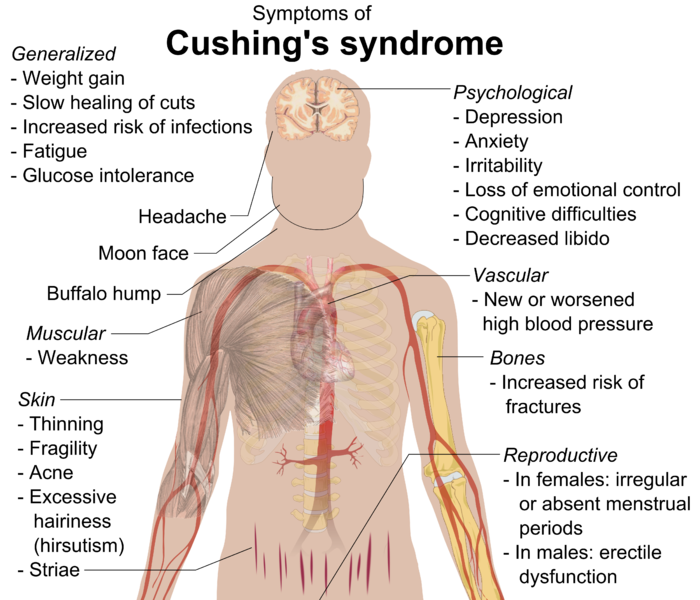All you need to know about Cortisol Stress Hormone

The body uses hormones for numerous processes, for example, development, cognitive performance, temperature regulation, and mood control. However, some hormones like the stress hormone only come alive during stress. So, what is the hormone for and why is it produced? It’s a natural steroid hormone secreted by your adrenal glands as a fight-or-flight reaction. Your body responds almost immediately upon sensing danger. The amygdala (brain center for emotional behavior) tells the hypothalamus to activate a series of reactions, including the production of hormones like cortisol and adrenaline.
Video Explaining the Stress Hormone Cortisol
What Is the Role of Stress Hormone Cortisol in the Body?
You might wonder what function does cortisol has in the body besides stress management. For starters, the hormone slows insulin release to prevent blood sugar storage and provides an instant energy source when you’re stressed. By shrinking your arteries, cortisol works with the hormone epinephrine that raises the heart rate to pump blood faster, and prepare your body for the immediate threat.
The stress hormone also boosts alertness, inflammatory response, and immunity. Although the hormone supports bodily functions, cortisol underproduction or overproduction invites complications. Low cortisol amounts signal adrenal insufficiency, otherwise called Addison’s disease. That means the adrenal glands cannot produce enough cortisol.
Addison’s disease could arise from autoimmune processes, genetic predisposition, or underlying conditions like HIV/AIDS and tuberculosis. Addison’s disease presents symptoms such as fatigue, diarrhea, abdominal pain, and irritability.
The condition also exposes you to Addisonian crisis, an acute corticosterone shortage triggered by injuries, intense stress, or an abrupt break from corticosteroids. You may experience lightheadedness, dehydration, and extreme weakness. If not treated early, an Addisonian crisis might kill you or throw you into a coma or shock. People with low levels of the hormone are sometimes treated with hydrocortisone.
On the flip side, excessive cortisol invites Cushing’s syndrome, an illness associated with a round face, weak muscles, and weight gain. Excessive levels might also suppress the immune system and trigger cardiovascular, digestive, and fertility complications.

What Is a Cortisol Test?
By measuring hormone levels, tests come in handy to reveal Addison’s or Cushing’s disease. The tests also reveal other infections in the adrenal glands. The checks can be:
- Urine Test
These tests identify free cortisol (a hormone that isn’t linked to a protein). Unlike blood and saliva alternatives that measure cortisol at a specific period, urine tests determine the cortisol excreted over 24 hours, making the procedure more comprehensive. If the doctor requires a urine test, you have to pee into a container whenever you visit the bathroom for a whole day.
- Blood Test to check hormone levels
If you’re wondering what the cortisol test is in blood? the procedure involves drawing blood samples using a needle. Due to the hormone fluctuations, blood tests occur twice per day—before noon when the hormone is at its highest and in the afternoon when levels are lower. The doctor might restrict particular substances before the test since they affect levels. They include synthetic glucocorticoids and drugs containing androgens and estrogen.
- Saliva Test to check how much of the stress hormone you are producing.
Studies suggest a 90% accuracy of the saliva test in identifying Cushing’s syndrome. This test is most precise around midnight when cortisol amounts are lowest. Increased cortisol levels during this period point to a disorder. Ordinarily, the test kit has a swab for collecting the sample and a storage container. Testing involves rolling the swab in the mouth until it’s covered in saliva. For correct results, avoid brushing your teeth, eating, or drinking 30 minutes before the test. What’s more, don’t touch the swab’s tip to avoid contamination.
The doctor may administer all the tests for accuracy. They might also observe your pituitary and adrenal glands using CT or MRI scans.
Diet Controlling Cortisol Levels Naturally
Although they stabilize cortisol levels, medication presents side effects like restlessness, nausea, and thin skin. However, you can manage the levels naturally using the following tips.
- Exercise
Apart from regulating blood sugar, physical activity elevates your mood and enhances sleep. However, levels may skyrocket when you train hard without rest. A better option is low-intensity workouts like yoga and nature walks.
- Healthy Eating
Since high cortisol raises blood sugar, you don’t want to worsen the situation with processed foods. Healthy eating especially carbs like sweet potato and brown rice goes a long way in managing sugar levels and improving your sleep. Again, steer clear of alcohol. Though it seems relaxing, booze elevates levels and affects blood pressure.
- Meditation
Meditation awakens your body’s relaxation response by easing your muscles and slowing your breathing rate and blood pressure. Meditation also blocks stressors, so you concentrate only on the present. Other mindfulness activities include deep breathing, journaling, and chewing slowly.
Lowering Stress
Knowing what is cortisol and its function in the body is the first step in managing this hormone. Although cortisol levels spike due to pregnancy, drug side effects, and adrenal gland infections, the cortisol stress hormone also causes these fluctuations caused by cortisol, The Primary Stress Hormone. That’s why you should avoid stressful situations and learn how to control your tension and overall stress levels. Do you struggle with anxiety? Share your stress outlets in the comments.



Hi Chris, Great post. See you have been busy since the last time I passed by. I have subscribed to receive updates so will be able to see any new posts once there published. As for the article I wrote about cortisol a few times on my blog but to be honest I actually know a bit more now after reading this. I hadn’t heard of Addison’s disease before so good job here. Always interesting to learn new things.
Best regards;
Alex
PS: If any of your readers are interested this is one of my top recommended products for cortisol relief;
https://dynamicideas4life.com/stress-and-cortisol-relief-review/
Thanks Alex. Your site is also a great source of information on health topics. I always find out something new in your posts to help keep my health in order even if I don’t follow the advice I can’t say that I unaware. I must look again at the pots you have about cortisol